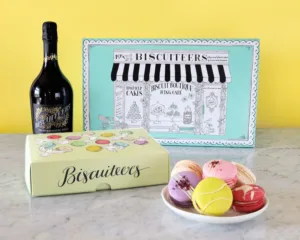Glynn Davis, our regular columnist and founder of Retail Insider, speaks to Dave Elston, founder of artisan food and drink retailer Elston & Son…
Can you tell us a little about Elston & Son?
Sure, it’s a business I started that focuses on selling West Country Artisan Food and Drink, so a bit like a deli but with more of an emphasis on drink than most delis. We’re online only, and stock products that you generally can’t find in the supermarkets. We fulfil all the orders ourselves from a small unit in South Somerset – I wanted to give the consumer the choice over quantity. I considered a marketplace or a drop-ship-type operation but that would have meant the consumer having to order six of this or 12 of that etcetera that I didn’t want to do. This has also allowed us to offer a broad range of hampers with mixed goods/producers.
What were the key drivers for creating the company?
I had this strong feeling that I wanted to do something myself. My career had been spent in the corporate world, and I felt I had the skills and experience to get something going, and I really wanted to scratch that itch and see what I could do. Living in the West Country you become very conscious of all the wonderful artisan producers there are down here and the fabulous food and drink available. There’s great cider makers, the cheese is wonderful, and fab brewers etcetera so that was a big input for me. So, the initial driver was the desire to do something myself, ideally involving West Country products, and so then I looked at various different options and the plan for Elston & Son developed through that.
You have held various senior digital roles, how did these help you with setting up your own business?
Interestingly I think the role that really helped me most was being an HMV store manager back in the glory days of HMV. As store manager you were given total responsibility for the stuff you’d expect, but at that time you were also responsible for all the visual merchandising and stock buying so you had complete control. If a new Madonna album came out I could buy one copy (probably a stupid decision) or 500 copies. But, and this was key, we were bonused on achieving profit (not sales, but profit) which was only paid if your store achieved its 12-month stock turn target i.e. how many times in a year the cash value of the stock turned over. Stock mgmt. is generally not the sort of metrics you get that exposed to as an Ecommerce or Digital Director and understanding these has really helped with the set up and running of Elston & Son. That’s not to say the digital roles haven’t helped, of course they have, in particular with some of the more technical aspects so things like stores design, navigation, SEO etcetera but I think running an ecommerce store is just like running a physical store – you have to have the same eye for standards, commerciality and customer service so it’s all helped. But there are some really big differences, In particular around resources available to do things so you do end up doing everything yourself.
What type of customers do you attract and how do you attract them?
It’s a real mixture of customers. There are some who love great West Country Cider, and that’s what they want to buy, others who are more into exploring what different products taste like, and a lot of gifters. How to attract them? That’s the million dollar question! We’re doing what I would call the normal range of things – so using Google (both paid and organic), social media (both paid and organic) and CRM. PR is an area we need to do more in and I wish I had more time to take our social channels up to the next level. I also believe customer service is also crucial for not only word of mouth but also encouraging people to shop again. Price is a challenging one – I don’t want to go down a discount route but then I’m offering 15% discount on sign-up to our newsletter so maybe I’m being hypocritical.
Can you share some numbers – sales, number of repeat customers, best-sellers etc..?
I won’t go into sales numbers but each month in 22 has grown on the previous month so I’m really comfortable with the trajectory. We’re still young and very much in that start-up mode. We’re working to hit bigger numbers over the coming months that will then give us a solid foundation to grow from. Events outside of our control are not helping but we’re focused on what we can get right and continue to grow the business. Sales wise cider, hampers and gin are our three biggest categories, which is interesting, as I think each one has a very distinct customer. Cider is quite niche, Hampers are very much aimed at the gift market, and Gin can be quite price-sensitive.
What challenges have you faced and what elements have you had to adapt?
There have certainly been lots of challenges on the way. I’ve deliberately focused spend on a few key areas, and resource is not one of them! So that has meant I’ve got to really focus on priorities and what order to tackle jobs in, and although some jobs are done quickly – much quicker than in a corporate environment- some do take a long time, or just end up on the back burner. For example, I’m keen to tweak the onsite navigation but as it’s a complex job I’ve decided to push it back until the New Year to allow me to focus more of my time on making sure the operation is ready for Christmas. Other challenges have included where work needs to be done that is not in your skillset, like IT. I had no knowledge of setting up emails – in the past I’d just phone someone and they’d do it for me but now that person has to be me. But it is very satisfying when you fix those problems, like the printer for the Parcelforce labels failing and getting it fixed even though I had no clue where to start!
In terms of adapting, we haven’t undergone any major pivots to the business since we went live but the biggest change I think we’ve made is adding Hampers. It was Sam, who helps me with some of the marketing elements, who persuaded me to add Hampers. We had to think about boxes, price bands, packing, and presentation etcetera so it did create a lot more work but it’s something I’m really glad we’ve done. It’s opened much more of the gift market to us as well as giving us Corporate Gifting opportunities, and they’re really enjoyable to plan out as well. I’d love to get some of our Christmas Hampers as a gift!
What is the greatest opportunity for the business?
That’s such a good question, and a difficult one to answer. If you’re talking about the single biggest opportunity, my head says hampers, my heart says cider. Hampers because of the gifting and corporate opportunity and there are both UX and product improvements we can make. Cider because it’s not only a growing market, but also because it is synonymous with the West Country and there are not that many people specialising in it.
Would you consider opening up physical space?
Yes. I think if we can get the right space, in the right place, then absolutely. It could really compliment what we’re doing, both as a shop but also as a place to experience what we sell. Would be great to be able to serve flights of cider or beer with flights of cheese.












